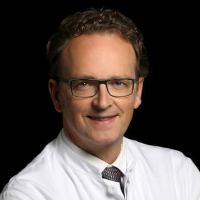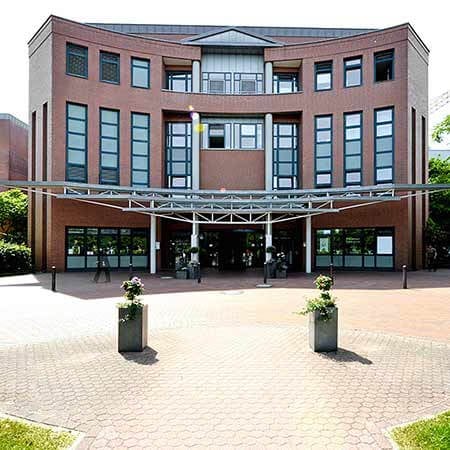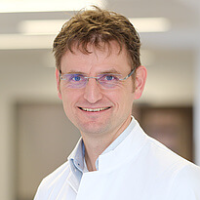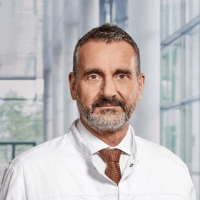CABG and Plastic Repair of Left Ventricular Aneurysm treatment in Germany
Treatment prices are regulated by national law of the corresponding countries, but can also include additional hospital coefficients. In order to receive the individual cost calculation, please send us the request and medical records.
The selection of doctors and clinics is carried out on the basis of annual qualification reports. The main selection criterion is the number of operations or procedures performed. It takes into account experience, reputation in the medical society, the availability of quality certificates and high specialization in a certain field.

Department of Cardiothoracic Surgery
According to the Focus magazine, the Department of Cardiothoracic Surgery ranks among the top German medical facilities specializing in the surgical treatment of diseases of the cardiovascular system and lung cancer! The department offers the full range of surgical services for the treatment of diseases of the cardiovascular system, respiratory tract, including heart and lung transplantation, artificial heart implantation. The therapeutic options include aortic surgery, coronary artery bypass grafting, transplantation surgery, surgical treatment of heart rhythm disorders (arrhythmias), minimally invasive surgery, surgical treatment of the heart valves, including reconstructive interventions. All operations are performed using state-of-the-art technology and in accordance with the current recommendations of professional societies.






Department of Cardiac Surgery
The Department of Cardiac Surgery provides a full range of surgical treatment in its area of specialization. Special emphasis is placed on heart valve repair and replacement surgery, coronary artery bypass grafting, thoracic aortic surgery, adult congenital and acquired heart disease surgery, pacemaker and defibrillator implantation, and artificial heart implantation for severe heart failure. Many heart operations are performed using minimally invasive techniques, which has a positive effect on the healing of the surgical wound. Minimally invasive cardiac procedures also reduce surgical risks and contribute to a rapid recovery of the patient in the postoperative period. Surgical treatment of cardiac pathologies is performed in advanced operating rooms equipped with the latest technology. The cardiac surgeons of the department successfully perform routine and complex surgical procedures, saving the lives of thousands of patients. The specialists work in accordance with current clinical protocols and follow the recommendations of the German Society for Thoracic and Cardiovascular Surgery (DGTHG).


Department of Cardiothoracic Surgery and Vascular Surgery
The Department of Cardiothoracic Surgery and Vascular Surgery provides effective surgical treatment for diseases of the heart, respiratory system, and blood vessels. The team of cardiac surgeons operates on patients with heart valve pathologies, coronary heart disease, heart failure, and heart rhythm disturbances. In the field of thoracic surgery, the key focus is on the surgical removal of lung tumors and lung metastases. The specialists in this area also perform surgery to repair chest wall deformities. In the field of vascular surgery, interventions for abdominal and thoracic aortic aneurysms are most often performed here. The department's vascular surgeons are also exceptionally competent in the treatment of peripheral occlusive arterial disease. A great advantage for the department's patients is that almost all surgical interventions are performed using minimally invasive techniques, so there is no need for a long postoperative recovery. The department's operating rooms are equipped with state-of-the-art technology. This allows for effective and safe treatment. The priority is always personalized medical care for patients.






A left ventricular aneurysm develops in patients with coronary heart disease as a result of myocardial infarction. The surgical repair is quite complicated. In addition, many patients require coronary artery bypass grafting, which makes surgery even more complex. It is best to have your diagnostics and treatment in countries with a high level of medicine to expect good results. You can seek treatment at one of the German Cardiac Surgery Centers. You are welcome to use the Booking Health service to find out the cost of treatment in Germany and choose a medical care program for your preferred dates.
Content
- When can a left ventricular aneurysm be treated with plastic repair?
- When can a left ventricular aneurysm be treated with coronary artery bypass grafting?
- How is surgery for a left ventricular aneurysm performed?
- Where to treat your left ventricular aneurysm?
When can a left ventricular aneurysm be treated with plastic repair?
An aneurysm is a protrusion in the wall of the left ventricle. This complication occurs in patients who have had a myocardial infarction.
In the event of a heart attack, a portion of the heart muscle dies. Connective tissue (scar tissue) subsequently forms in its place. It is unable to contract. Under the constant pressure of blood on the wall of the beating heart, the connective tissue gradually weakens. If the scar is large, thin, and not strong enough, a bag-shaped protrusion of the wall is formed at this site. It causes arrhythmias and impairs the work of the heart.
Postinfarction left ventricular aneurysms are formed in 10% of patients following myocardial infarction. They affect life expectancy, so they require treatment. Drug therapy only helps to alleviate the symptoms of the pathology but cannot eliminate the ventricular aneurysm itself. Surgical treatment is required to restore the normal shape of the left ventricle. Without surgery, the five-year survival rate of patients is 50-70%, according to estimates by different authors. The causes of death are ventricular arrhythmias, heart failure, and recurrent myocardial infarctions.
When can a left ventricular aneurysm be treated with coronary artery bypass grafting?
Ventricular aneurysms develop following myocardial infarction, and myocardial infarction is a manifestation of coronary heart disease, which is insufficient blood supply to the heart muscle due to atherosclerotic narrowing of the coronary arteries. Many patients undergo coronary artery bypass grafting (CABG) surgery aimed at restoring the blood supply to the heart muscle, along with an aneurysm repair.
CABG allows for:
- avoiding recurrent myocardial infarction;
- improving blood supply to the heart muscle;
- increasing tolerance to physical activity;
- improving the quality of human life;
- restoring working capacity;
- increasing life expectancy.
CABG in patients with left ventricular aneurysms is often not the first, but a revision surgery for revascularization (restoration of blood supply) in the myocardium. Revision interventions are technically much more complex than primary ones. It is therefore best to undergo such an operation at a reputable Cardiourgery Clinic. The surgical intervention is complicated by the altered anatomy of the heart, adhesions after the first operation, and the presence of previously implanted functioning shunts. Nevertheless, surgeons at the hospitals abroad deal with even the most complex tasks. They successfully perform simultaneous plastic repair surgery for a ventricular aneurysm with coronary artery bypass grafting, including in cases of revision CABG after previously performed heart surgery.
How is surgery for a left ventricular aneurysm performed?
The operation is performed under general anesthesia. The heart is approached by a sternotomy (an incision in the center of the sternum). A heart-lung machine is used, since a patient needs an intervention not only on the coronary arteries but also on the left ventricle to eliminate the aneurysm.
Doctors create bypasses for blood flow to restore blood access to the myocardium. A variable number of bypasses may be required, usually from 3 to 10, depending on the severity of coronary heart disease and the number of atherosclerotic blood vessels. New blood vessels are formed from the internal thoracic artery, while veins are used much less frequently. In recent years, doctors have refused to use veins because such bypasses have a shorter life. After a few years, they become clogged with atherosclerotic plaques, so patients need revision coronary artery bypass grafting.
Different surgical techniques can be used for aneurysm treatment, depending on where the aneurysm has formed and what size it has. Basic operations are the following:
Linear plastic repair is surgery, during which doctors remove connective tissue from the area of the aneurysm and suture the muscle tissue together. This operation was the main treatment method until the end of the twentieth century, but it is rarely used today. It can also be performed in the Mickleborough modification on occasion. It involves performing an operation without any cardiac arrest (but under conditions of cardiopulmonary bypass), so doctors can see which parts of the myocardium continue to contract. So they distinguish muscle tissue from connective tissue to completely remove the scar and areas of non-viable myocardium.
Jatene and Dor plastic repair procedures are more reliable operations available in Germany. These were developed at the end of the twentieth century. During surgical treatment, doctors remove the aneurysm, and the defect is repaired with a Dacron patch. A new cavity in the left ventricle is formed. Cardiac surgeons strive to make the heart's shape as close to physiological as possible, since in this case the best function of the heart can be ensured.
Septoplasty can be an additional stage of any type of operation. It is required when the interventricular septum is involved in the formation of a left ventricular aneurysm. Doctors close the defect with a patch.
Pacopexy, or SAVE, procedure is another surgical treatment option. During surgery on a beating heart, but with cardiopulmonary bypass, doctors dissect the ventricle. Sutures are placed along the interventricular septum, from the apex of the heart and almost to the aortic valve. They are also applied to the anterolateral wall of the left ventricle. A patch is then formed, which is implanted along the excluded area of the aneurysm. The treatment technique preserves the elliptical shape of the left ventricle.
Where to treat your left ventricular aneurysm?
You can undergo your left ventricular aneurysm treatment in Germany. Successful operations are performed here both with and without a heart-lung machine. Doctors use modern modifications of operations to distinguish pathologically altered areas of the myocardium from normal heart tissue, completely remove the left ventricular aneurysm, and restore its shape. When performing the operation, doctors also create new blood delivery routes to the myocardium so that you can get rid of the symptoms of the disease and avoid a second heart attack.
Despite the complexity of the operation, the treatment of the disease in Germany is successful in more than 90% of patients. Complications are uncommon.
Germany is a country offering a high level of medicine. Hospitals in Germany have state-of-the-art equipment, and German cardiac surgeons have a perfect reputation all over the world. Here you will find accurate diagnostics and modern treatment for cardiovascular diseases.
You can make an appointment for your diagnostics and treatment at one of the German Cardiosurgery Centers through the Booking Health service. Our website offers the current prices for CABG with left ventricular aneurysm repair. When you make your appointment through Booking Health, the cost of treatment will be beneficial for you due to the absence of taxes for foreign patients. The initial cost of treatment will not increase after the start of the medical care program, as you will receive insurance against unexpected medical expenses.
The Booking Health specialists will take care of arranging your treatment for heart diseases at one of the leading Cardiac Surgery Centers. We will contact the hospital administration, book a hotel room and airline tickets for you, meet you at the airport, and take you to the hospital by car. You will be provided with interpreting services and support during the entire period of your treatment at a Cardiac Surgery Center abroad.
Authors:
The article was edited by medical experts, board-certified doctors Dr. Nadezhda Ivanisova and Dr. Vadim Zhiliuk. For the treatment of the conditions referred to in the article, you must consult a doctor; the information in the article is not intended for self-medication!
Sources:
ECR - European Cardiology Review

